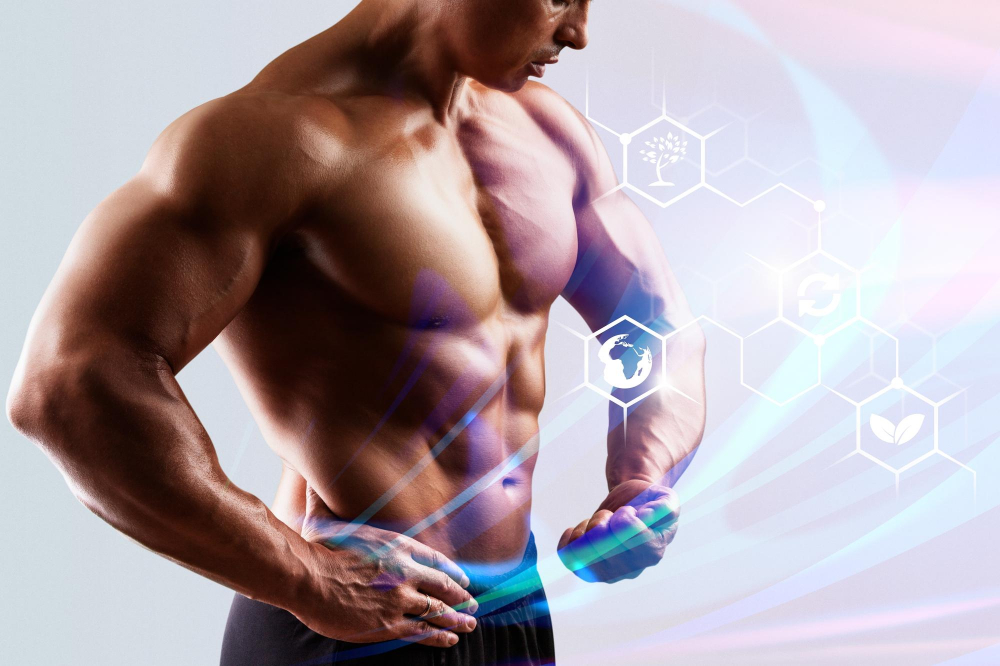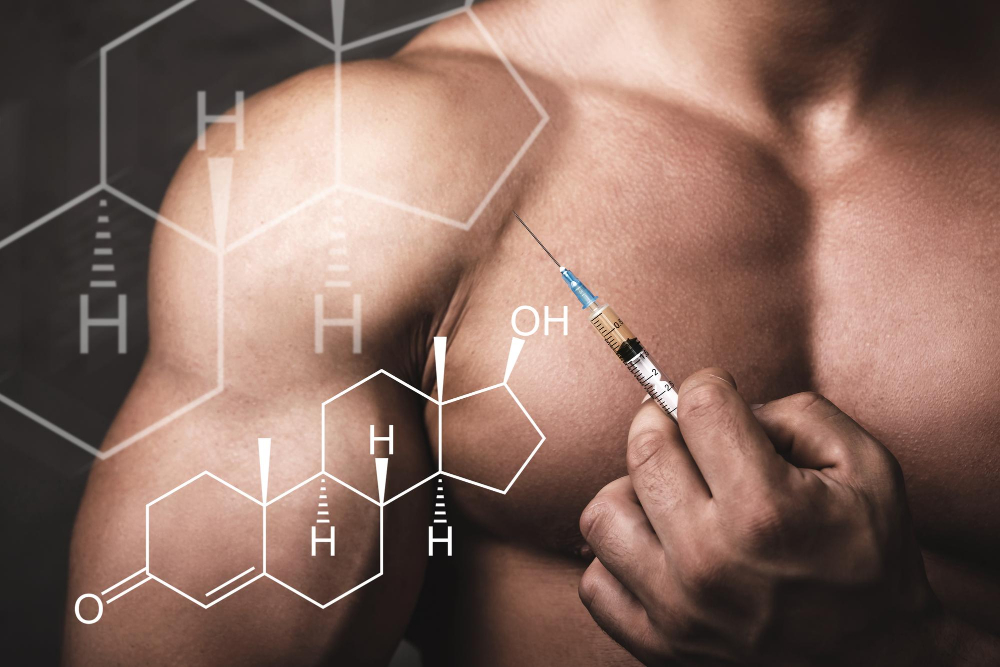
Testosterone is the primary male hormone responsible for regulating sex differentiation, producing male sex characteristics, muscle mass and strength, spermatogenesis, stamina, bone density, sexual desire (libido), and fertility. Testosterone is made in the testicles (gonads).
Testosterone’s effects are first seen in the fetus. During the first six weeks of development, the reproductive tissues of males and females are identical.
Testosterone is the primary male sex hormone and androgen (sex steroid hormone) in males. Females too produce and use testosterone in their bodies but not to the degree the male body does. In females, testosterone is a minor hormone with estrogen and progesterone being their primary and dominant hormones. Males too produce estrogen and progesterone but very, very low amounts. Testosterone acts and performs differently in the male body than it does in the female body.
In humans, testosterone plays a key role in the development of male reproductive tissues such as testicles and prostate, as well as promoting secondary sexual characteristics such as increased muscle and bone mass, and growth of body hair. Testosterone, as stated above, regulates the male sex drive, called libido.
Low testosterone can adversely affect sex drive, mood, and changes in muscle and fat. See our article “The Adverse Effects of Low Testosterone.”
When men are deficient in testosterone, known as testosterone deficiency (TD) and medically described as hypogonadism, the body speaks through metaphor (disease, disorder, and/or dysfunction), or signs.
Specific signs or symptoms of Testosterone Deficiency (TD) include:
Reduced sex drive
Reduced erectile function
Loss of body hair
Less beard growth
Loss of lean muscle mass
Feeling very tired all the time (fatigue)
Obesity (being overweight)
Symptoms of depression
Okay, now let’s talk about free testosterone.
Free testosterone is the amount of testosterone in the blood that is not attached to proteins. Most testosterone is attached to proteins such as albumin and sex hormone-binding globulin (SHBG) which prevents tissues from using it immediately. Free testosterone is easier for the body to use and can directly enter cells.
Total testosterone is the total measure of testosterone in the bloodstream – both free and bound. Levels are measured by an analyzer directly.
Even if your total testosterone concentration test results are average, you may still have low free testosterone levels. Low free testosterone levels may lead to frustrating symptoms of hypogonadism, decreased sex drive (libido), erectile dysfunction, including loss of morning erections (morning wood).

With free testosterone covered, let’s now cover TRT or Testosterone Replacement Therapy?
A common question I get asked all the time by men, is: “Djehuty, is TRT safe and effective?” With a responsibility to humanity to always be truthful and keep things real, my answer to them is a resounding no!
TRT is not safe! It’s too risky and not worth one’s health. There are just too many adverse side effects with TRT and if not immediately, then in the long run. I would know because I deal with and have dealt with a lot of men who were on the TRT and suffered all kinds of horrible adverse side effects, including but not limited to: testicular shrinkage or atrophy, decreased sperm count, adverse heart and/or cardiovascular conditions (including heart attacks), enlarging breasts, aggressive behavior, and prostate cancer (which can prove fatal).
That’s right, dear reader! TRT can cause your balls (testicles) to shrink in size (half of their original size before TRT). Think about that for a minute. Do you want to become known as “little balls”? Do you want to lose the ability to sire children, or sire more children? Think about that. Do you want to develop and deal with cancer and the possibility of dying? According to the American Cancer Society, it is estimated that 1 in 44 men will die of prostate cancer. Think about these risks. Are they worth it just to increase and/or maintain normal testosterone levels?
It is true that as men age, our testosterone levels naturally decrease, especially if or when our diet is crap (high in animal products which are female-derived products dependent on primary female hormone—which is estrogen). We’re not eating the same meats our grandfathers ate pre-WW2. Ever since the agriculture industry was taken over by the chemical industry in the U.S., becoming agrochemical (think Monsanto, for example) and merging with agricultural biotechnology, our meat and dairy products have been massively pumped full of synthetic female growth hormones (synthetic estrogen) that ends up in our bodies as men and interfere with our hormonal balance, producing an excess of aromatase in the process.
Aromatase is an enzyme that converts androgens into estrogens, resulting in man boobs, or what is medically called gynecomastia (a medical condition whereby there is an increase in the amount of breast gland tissue in boys or men). This is the unfortunate result of a man consuming way too much estrogen (in the form of diet, notably animal protein) in addition to being exposed to environment endocrine disrupting chemicals (EDCs) which are found in almost everything we’re exposed to daily.
Our T levels decrease by one percent each year starting at around age thirty (30).
T levels are medically measured through blood tests with doctors generally agreeing that normal T levels are between 300 to 1,000 nanograms per deciliter (ng/dL). An ideal T level is 600 which is the middle of 300 and 1,000.
So, what is the safe, sane, and effective alternative to TRT? The answer is always found in nature. The safe, sane, and effective alternative to TRT is plants, herbs; especially libidogenic herbs.
Libidogenic herbs are herbs that increase the libido or sex drive which is a major function of testosterone. Libidogenic herbs contain phytoandrogens that mimic the natural function of testosterone, serving as a testosterone precursor while simultaneously causing the body to produce and maintain more free testosterone.
Libidogenic herbs or herbs that help boost testosterone include Bulbine Natalensis (Rooiwortel), Akarkara root (Anacyclus pyrethrum), Maral root (Raponticum carthamoides), Fenugreek seed (Trigonella foenum graecum), Tongkat Ali root (Eurycoma longifolia), Butea Superba root (Butea superba Roxb.), Sarsaparilla root (Smilax ornata), Horny Goat weed (Epimedium grandiflorum), Ashwagandha root (Withania somnifera), Milky Oats (Avena sativa), and Ajuga Turkest (Ajuga turkestanica (Regel) Briq.) just to name a few.
ManDyngo.com’s T-Booster formula contains libidogenic herbs that help with maintaining and increasing testosterone levels in men.
Thank you for reading.
The information in this article is for informational and educational purposes only and does not substitute professional medical advice or consultations with healthcare professionals.
Djehuty Maatra is an entrepreneur, documentary filmmaker, health product innovator, herbalist, and freelance health writer with over twenty-five years’ experience in the health and wellness and nutritional supplement fields.
This article is compliments of ManDyngo.com.
